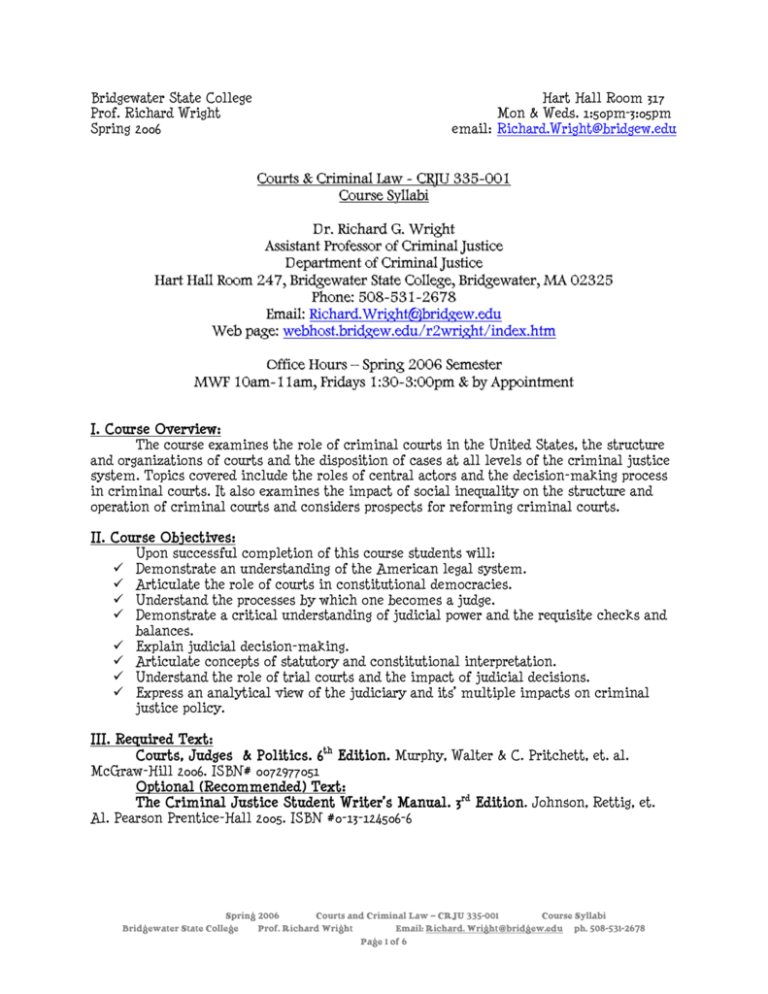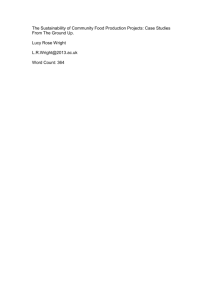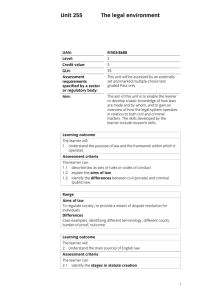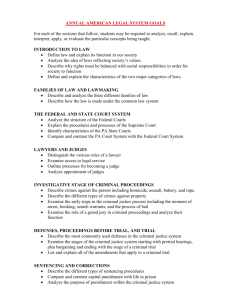
Bridgewater State College
Prof. Richard Wright
Spring 2006
Hart Hall Room 317
Mon & Weds. 1:50pm–3:05pm
email: Richard.Wright@bridgew.edu
Courts & Criminal Law - CRJU 335-001
Course Syllabi
Dr. Richard G. Wright
Assistant Professor of Criminal Justice
Department of Criminal Justice
Hart Hall Room 247, Bridgewater State College, Bridgewater, MA 02325
Phone: 508-531-2678
Email: Richard.Wright@bridgew.edu
Web page: webhost.bridgew.edu/r2wright/index.htm
Office Hours – Spring 2006 Semester
MWF 10am-11am, Fridays 1:30-3:00pm & by Appointment
I. Course Overview:
The course examines the role of criminal courts in the United States, the structure
and organizations of courts and the disposition of cases at all levels of the criminal justice
system. Topics covered include the roles of central actors and the decision-making process
in criminal courts. It also examines the impact of social inequality on the structure and
operation of criminal courts and considers prospects for reforming criminal courts.
II. Course Objectives:
Upon successful completion of this course students will:
Demonstrate an understanding of the American legal system.
Articulate the role of courts in constitutional democracies.
Understand the processes by which one becomes a judge.
Demonstrate a critical understanding of judicial power and the requisite checks and
balances.
Explain judicial decision-making.
Articulate concepts of statutory and constitutional interpretation.
Understand the role of trial courts and the impact of judicial decisions.
Express an analytical view of the judiciary and its’ multiple impacts on criminal
justice policy.
III. Required Text:
Courts, Judges & Politics. 6th Edition. Murphy, Walter & C. Pritchett, et. al.
McGraw-Hill 2006. ISBN# 0072977051
Optional (Recommended) Text:
The Criminal Justice Student Writer’s Manual. 3rd Edition. Johnson, Rettig, et.
Al. Pearson Prentice-Hall 2005. ISBN #0-13-124506-6
Spring 2006
Courts and Criminal Law – CRJU 335-001
Course Syllabi
Bridgewater State College
Prof. Richard Wright
Email: Richard. Wright@bridgew.edu ph. 508-531-2678
Page 1 of 6
IV. Course Expectations & Information:
Students are expected to attend class regularly with course material read prior to
class. Should a student need to miss a class, they are requested to email or call Prof.
Wright, prior to the class to explain their absence. Students are expected to take scheduled
exams and submit assignments on time, as penalties for lateness and missed exams are
described below.
Students are strongly recommended to continually ask questions and encourage
debate. To achieve a critical view of the courts and the criminal justice system,
questions and discussion is essential. It is also recommended that as needed, students
meet with Prof. Wright to ensure their comprehension of the course material, clarification
of its application to contemporary crime problems and/or assistance in the writing
assignments. Students are expected to work independently on their writing assignments but
may seek assistance for the BSC Writing Studio.
Students are required to enroll on this course’s companion Blackboard site. Students
must enroll using their *@bridgew.edu email address. To enroll, go to
blackboard.bridgew.edu and select this course either by course name and number or the
instructor. Students are required to routinely check the Blackboard site as critical
documents, announcements and information will be regularly posted.
V. Exams, Assignments & Grading:
1. Exams –
The course will include two examinations, a mid-term and the final exam. The
exams may be composed of all-essay questions. Exams will cover material in the textbook,
class discussions and any additional materials provided in class. Students will be expected
to be fully prepared for exams. There are NO make-up exams. In the event of an
extreme emergency and a student misses an exam, Prof. Wright MAY assign the
student an additional writing assignment. In this rare situation, students will be
required to provide documentation of situation (e.g., hospital admitting record, death
certificate).
2. Writing Assignments –
This course requires two writing assignments. The first assignment is a review of the
confirmation hearings of Supreme Court nominee Samuel Alito. The second paper is an
assignment on judicial accountability.
a) Writing Assignment #1: Review of Alito Confirmation Hearings:
As will be discussed throughout the course, the U.S. Supreme Court has a profound
effect on our lives. On October 30th, 2005, Federal Appeals Court Judge Samuel Alito was
nominated as an Associate Justice on the Supreme Court to replace Justice Sandra Day
O’Connor who resigned. Judge Alito’s nomination is considered critical for a number of
reasons.
First, Judge Alito was President Bush’s third choice to replace O’Connor. John
Roberts was the President’s initial choice but his nomination was withdrawn and
resubmitted to replace Chief Justice Rehnquist, when Rehnquist died in September 2005.
Harriet Miers, an attorney in the Office of White House Counsel and a former private
attorney of the President was the second choice to replace O’Connor. Ms. Miers, whose
nomination was viewed as very controversial, withdrew her nomination in October of ’05.
The President then nominated Judge Alito.
Secondly, if confirmed, Judge Alito would replace Justice Sandra Day O’Connor.
Justice O’Connor was often considered the “swing vote” in many controversial issues,
particularly, when the court was divided often among ideological lines (e.g., conservative vs.
liberals). In cases involving crime, environmental protection, the death penalty, Justice
O’Connor was often the deciding vote on an issue’s legality.
Spring 2006
Courts and Criminal Law – CRJU 335-001
Course Syllabi
Bridgewater State College
Prof. Richard Wright
Email: Richard. Wright@bridgew.edu ph. 508-531-2678
Page 2 of 6
Judge Alito’s confirmation hearings begin on January 9th, 2006. It is expected that the
hearings, conducted by the Senate Judiciary Committee, will last 3 to 5 days. Judiciary
Committee Chairman, Senator Arlen Specter (R-PA) will preside over the hearings with the
other 17 members (9 Republican, 8 Democratic) asking questions of Judge Alito. After the
hearings, the Judiciary will vote as to whether they recommend that Alito is appointed to
the Supreme Court. Their vote is non-binding and after the hearing, the full Senate will
vote on the nomination. It is after the full Senate has voted that Judge Alito will either be
confirmed or rejected.
The entire confirmation hearings will be broadcast and regularly replayed on CSPAN, a cable TV station for the coverage of politics. Much of the hearings will also be
replayed on network television stations including PBS, CBS, ABC, NBC, CNN, FoxNews, etc,
Additionally, the Maxwell library is purchasing the DVD’s of C-Span’s coverage of the
confirmation hearings.
Although many of the issues raised during the confirmation hearings will be very
specific points of law and legal precedence, it is critical that students are aware of and
informed about the hearings. The public debate on this nomination has focused on how, if
confirmed to the court, Judge Alito would rule on such controversial issues such as the
constitutionality of Roe V. Wade (right to privacy/an abortion), the death penalty, the power
of the President to hold “enemy combatants” indefinitely, the separation of church and
state, rights of criminal defendants and many others.
Students are required to watch at least TWO (2) HOURS of coverage of the
confirmation hearings. Students are free to watch on their own and may borrow the DVD’s
from the library from this assignment. Should students have C-SPAN at their residence,
they should check C-SPAN’s website for dates and times that the confirmation hearings
will be rebroadcast. Students can find the re-broadcast information at www.c-span.org and
click on the upper left hand corner link “Supreme Court.” If broadband internet access is
available, students are also free to watch the hearings online at C-Span’s website,
www.c-span.org. Students are also free to watch the hearings on other network or broadcast
TV stations.
After watching the confirmation hearings students will write a four (4) to six
(6) page paper, discussing the following questions and issues:
1. Summarize the key issues and questions which were raised during the
portion of the hearings you watched.
2. How do you think the members Senate Judiciary Cmte. are determining
whether or not they should vote to confirm Judge Alito?
3. What criteria do you think should be used to determine whether Alito
should be confirmed to the Supreme Court?
4. Given that appointment to the Supreme Court is a lifetime appointment,
and that the Court is the “final arbiter” of constitutionality, do you think
a nominee should be required to disclose either their political views OR
how they would rule on controversial issues? Why or Why not?
Students are allowed to use limited supplemental materials (e.g., newspaper
coverage) to aid their discussion of the Alito nomination. Should students use newspaper
coverage, they are limited to three (3) articles. Should students use supplemental material,
they must cite it correctly.
b) Writing Assignment #2: “Judicial Accountability”
As discussed throughout the semester and throughout the criminal justice program,
there is a great deal of concern over how judges should be held accountable for their
behavior and decisions. Yet, the nature of a judge’s role is, in effect to rule for one party
over another. By the nature of the adversarial relationship of our legal system and the
judges’ influence it is very common that the “losing” party in a case may hold a “grudge”
against the judge or try to discredit the judge.
Spring 2006
Courts and Criminal Law – CRJU 335-001
Course Syllabi
Bridgewater State College
Prof. Richard Wright
Email: Richard. Wright@bridgew.edu ph. 508-531-2678
Page 3 of 6
Some states have decided that the way to hold judges accountable is make judicial
selection an elected (as opposed to appointed) position. Others have considered an
mandatory retirement age or term limit that a judge must adhere to. Some states have
proposed tightening judicial ethics guidelines. There have been instances of impeachment or
political recall of appointed judges. Some federal lawmakers have taken the position to
publicly criticize the judiciary as “activist” or unaccountable. Some defendants have even
decided the way to hold a judge accountable is murder.
For this writing assignment, students will be provided a small reading packet
and will write a four (4) to six (6) paper on the following:
1. Discuss what system(s)/process(es) you believe best holds judges
accountable for their behavior and decisions? Why? What are the strengths
and weaknesses of that system(s) or process(es)?
2. Given that judges will inevitably render unpopular decisions (which may
have very serious consequences – e.g., overturning a murder conviction,
ruling a mistrial involving a child molester, or deciding that the President
cannot indefinitely hold terrorists without criminal charging them), how
would you ensure that judges are protected from threats, retaliation or
violence to ensure their impartiality?
LATE PAPERS
If a student submits any writing assignment late, the student will receive a penalty
on that paper. For each class session any paper is late, the paper will be lowered by one full
grade. In extreme exceptions, the professor may grant an extension. This will only be done
in extraordinary circumstances and will require documentation from the student as to the
reason for the extension.
PLAGIARISM:
The purpose of these papers is to demonstrate an awareness of the courts and their
impact on the criminal justice system. It is critical that students understand that these
assignments are individual and original writing and plagiarism will NOT be tolerated.
Plagiarism, or the misappropriation and/or misattribution of another person’s work
to one’s individual efforts are severely discouraged. Plagiarism, one form of academic
misconduct, may result in a failure for the course in which the violation took place. A
record of the violation is kept and may result in suspension or dismissal from the college.
Students should refer to the BSC student handbook or
(http://www.bridgew.edu/Handbook/PoliciesProcedures/academicmisconduct.cfm) for
questions regarding academic misconduct penalties and procedures.
Forms of plagiarism include but are not limited to utilizing ANY online paper
writing/delivering service, “cutting and pasting” text from other works, uncited sources,
having another individual write all or portions of a student’s paper, and/or altering other
published material. When in doubt, students should appropriately cite a work, consult with
library staff and Prof. Wright.
For either writing assignment students may conduct additional research. If
additional research is conducted, the following guidelines are in effect.
• Appropriate sources include governmental websites, academic journal articles, books,
interviews with criminal justice personnel and select newspapers or magazines.
• Select online sources are acceptable. Acceptable websites include university or
government based research sites (*.gov or *.edu) and national criminal justice sites
(ncjrs.org, etc.) Reputable newspapers (e.g., the Boston Globe, Herald, New York Times, etc.)
are acceptable. Students are discouraged from using advocacy websites. If a student is in
question about the acceptability of any source, contact the professor. As with all sources, all
online information used, must be appropriately cited.
Spring 2006
Courts and Criminal Law – CRJU 335-001
Course Syllabi
Bridgewater State College
Prof. Richard Wright
Email: Richard. Wright@bridgew.edu ph. 508-531-2678
Page 4 of 6
• All writing assignments, utilizing any research, must adhere to the American
Psychological Association (APA) guidelines for in-text citations and the bibliography. See
the BSC library for guidance on APA formatting.
http://www.bridgew.edu/Library/styleman.cfm
ADDITIONAL PAPER GUIDELINES:
Students should utilize The Criminal Justice Student Writer's Manual 3rd Edition
for help in writing, revising and citing their papers.
• All papers must be typed and formatted with an 11 or 12 point font, 1” margins, stapled,
and double-spaced with appropriate page numbers.
• To ensure that students do not plagiarize material, all papers will be submitted to
www.turnitin.com. Turnitin.com is an anti-plagiarism service the college subscribes to.
When writing assignments are due, students will hand in a paper copy AND will upload, via
Blackboard, an electronic copy of their paper. Papers will receive a “plagiarism” score
identifying what and how much of a paper was plagiarized.
3. Preparedness/Attendance & Participation –
In order to understand judges, the courts and their many impacts on the criminal
justice system and to develop a critical view of its operation, students are required to
attend class fully prepared and to participate in class discussions. Students must stay
current with the course readings and be prepared to offer their own observations and
questions. Preparedness and participation has been allocated to count for 10% of the
student’s grade.
4. Grading Students’ grades are composed of the following:
a) Writing Assignment #1 - Review of Alito Confirmation Hearings
- 20% of grade.
b) Writing Assignment #2 – Judicial Accountability
- 20% of grade.
c) Mid-term examination
- 20% of grade.
d) Final Examination
- 30% of grade.
e) Preparedness/Attendance/Participation
- 10% of grade.
VI.
Extra Credit
At his discretion, Prof. Wright may offer one extra credit assignment during the
semester. If such an assignment is offered, it will be a short 2-4 page writing assignment of
Prof. Wright’s choosing. If offered, Prof. Wright will provide written guidelines for the
assignment. Additionally, if offered the assignment may add 2-4 points to a student’s
cumulative final average.
Spring 2006
Courts and Criminal Law – CRJU 335-001
Course Syllabi
Bridgewater State College
Prof. Richard Wright
Email: Richard. Wright@bridgew.edu ph. 508-531-2678
Page 5 of 6
VI. Course Outline & Reading Assignments:
The following is a schedule of reading and written assignments and their
corresponding due dates. Pay close attention to the dates that assignments are due and
exams conducted. As mentioned earlier, there are NO MAKE-UP EXAMS! Changes to this
schedule may occur throughout the semester. Please check with Prof. Wright (and on
Blackboard) for any in-class modifications to the schedule.
Date
Week 1 – Wk. of 1/16
Week 2 – Wk. of 1/23
Week 3 – Wk. of 1/30
Week 4 - Wk. of 2/6
Week 5– Wk. of 2/13
Week 5 – Wed. Feb. 15th
Week 6 – Wk. of 2/20
Week 7 – Wk. of 2/27
Monday Feb. 27th
Week 7 – Wed. March 1st
Week 7 Fri March 3rd
Week 8 – Wk. of 3/6
Week 9 – Wk. of 3/13
Week 10 - Wk. of 3/20
Week 11 – Wk. of 3/27
Week 11 – Mon. March 27th
Week 12 – Mon. 4/3
Week 13 – Wk. of 4/10
Week 14 – Wk. of 4/17
Assignment
Introductions, Review of Syllabi, Course Goals,
Policies & Assignments
Chapter 1: Political Jurisprudence
Chapter 2: Courts in Constitutional Democracies
Chapter 3: Judicial Organization
Chapter 4: Judicial Selection and Retention
Chapter 5: The Bar
Writing Assignment #1:
Alito Confirmation Hearings Paper Due!
Chapter 5: The Bar
Chapter 6: Access to Judicial Power
Review for Mid-term Exam (Chapters 1 -5)*
Mid-term Examination!
Chapter 6: Access to Judicial Power
Spring Break – No Classes
Chapter 7: Instruments of Judicial Power
Chapter 8: Limitations on Judicial Power
Writing Assignment #2: Judicial Accountability Due!
Chapter 9: Fact Finding in the Courts
Chapter 10: Precedents and Legal Reasoning
Chapter 11: Statutory Interpretation
Chapter 12: Constitutional Interpretation
Week 15 – Wk. of 4/24
Chapter 12: Constitutional Interpretation
Chapter 13: The Processes of Judicial Decision-Making
Week 16 – Week of 5/1
Chapter 13: The Processes of Judicial Decision-Making
Chapter 14: The Impact of Judicial Decisions
Friday May 5th
Review for Final Exam
Week 17
Final Exam - TBA
* The mid-term examination will tentatively cover these chapters.
Please note that there are NO CLASSES on
Monday Feb. 20th (President’s Day) & Monday April 17th (Patriots Day)!
As per college policy, Classes on Monday Feb. 20th will be held on Tuesday Feb. 21st.
Spring 2006
Courts and Criminal Law – CRJU 335-001
Course Syllabi
Bridgewater State College
Prof. Richard Wright
Email: Richard. Wright@bridgew.edu ph. 508-531-2678
Page 6 of 6









